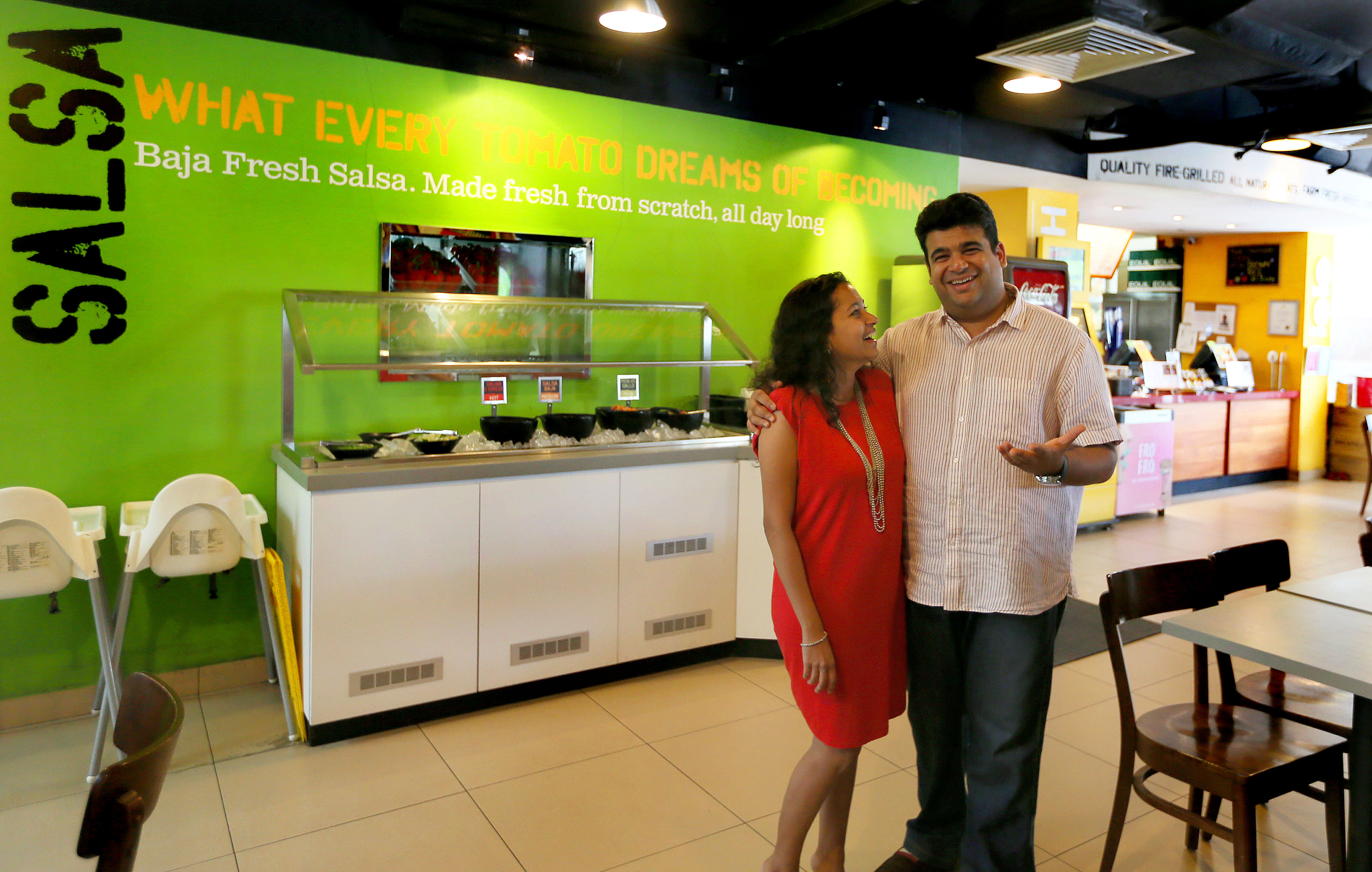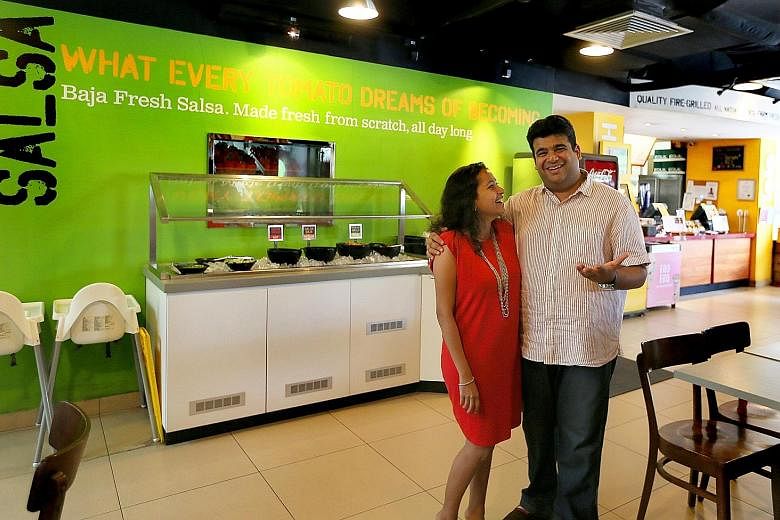One of the early triumphs of Mr Anant Hada's life was to secure an investment banking job when he was aged just 21.
He was one of only a handful of graduates from Singapore Management University (SMU) to achieve this feat, back when SMU was a new university. But after more than five years in the job, he followed his love for food and invested in Baja Fresh Mexican Grill at Rendezvous Gallery in Bras Basah Road in 2012.
In 2013, he felt confident enough in the business to leave investment banking to join his wife, Ms Jaya Hada, now 30, as a full-time Baja Fresh director.
Now aged 31, Mr Hada, who was born in Kolkata but is now a Singapore permanent resident, says: "I was 27 when I started Baja Fresh and with a venture capitalist coming on board in 2013, it just felt right. If not, I wouldn't be able to take the risk 10 years down the line."
While Baja Fresh - which has outlets in Rendezvous Hotel's Rendezvous Gallery, Singapore American School and The Sail - is now his passion, finance remains his first love.

"Finance has always interested me, and I was rated the best finance student at SMU in year two. As a 21-year-old then, to get $100,000 a year in one of the highest-paying industries, it was glamorous... I was rubbing shoulders with people from Ivy League colleges.
-
Worst and best bets
-
Q What has been your biggest investing mistake?
A Someone might say: "You invested in two houses; you're in real estate for the long term, but the Singapore property market is going through a downturn. Is that a mistake you've made?" It's not a mistake; they are assets.
I'd probably give it a couple of years before it gets better. I'd say I don't have a $4,000 rental bill every month.
Q And what has been your best investment move?
A Buying a house at 21 when people were surprised that I didn't buy a watch.
When I moved back to Singapore from Hong Kong, that investment gave me the capital we needed to buy our current home.
My colleagues asked: "Why don't you buy a good suit or watch? You've just come out of college and you're living like a college student; why not buy something expensive for yourself instead of investing in a house?" I did buy a watch, but only last year, for my 30th birthday.
Rachael Boon
"I couldn't believe it when I got through; SMU did a lot to train me for that 80 to 90 hours at my desk (type of job). SMU made us rough and tough. The first six years of investment banking was good training... You meet deadlines and (survive) really tight pressure which you haven't done before."
Q Moneywise, what were your growing-up years like?
A I come from a family of entrepreneurs. We had a textile plant in India. My elder brother started his own business in the IT industry. I also have an elder sister.
It was always inculcated in us that we must be independent. We were always told not to rely on ancestral wealth, to complete college and figure out life on our own.
I used to work part-time at the Singapore Indian Chamber of Commerce and Industry while at SMU, where I studied under a full scholarship. I used to earn $500 a month. It was good pocket money and enabled me to indulge in a good meal or weekly movie outings and such.
Q How did you get interested in investing?
A When I first started investment banking, it was the heyday; I had a good sign-on bonus. One of the things people talked about in the office, those older than me, was about looking at apartments.
There was a property being constructed next to where I was living, and every morning, I'd wake up to the construction noise. Over the weekend, I thought: "Why not look at the showflat?"
Back then, Singapore still had a deferred payment scheme where you just pay 10 per cent deposit for something under construction and you don't have to worry about the loan until it's completed.
The apartment was for $500,000 in 2007 and I thought: "Why not? Money has come in. If I don't put it in here, I'm going to squander it away. After a few days, I told my associates I had invested in a property and they asked me: "Do you even have a watch?" (laughs)
The next few years, I focused on paying my down payment. It was good from 2007 to 2010 - the Dow Jones dropped 20 per cent and S&P 500 went down 50 per cent, whereas the Singapore property market was in full upswing.
In 2009, the property was completed and I was in Hong Kong. I hadn't even seen the property and sold it for $750,000. I made a 250 per cent return on equity.
Q Describe your investing strategy.
A Equities are a lot riskier and require day-to-day management. I'd rather invest in something like my own business or property which are tangible and I can see growth.
The old saying is that you should invest in things you can control. We believe in long-term investments in things that make a short, quick gain. We do invest in mutual funds.
Property in Singapore is fundamentally a long-term play, and historically and going ahead will give good returns, for instance.
With Baja Fresh, we wanted to invest in our passion. At that point, we didn't think about whether it'd make money, and thought if we put our heart and love into it, it'd be a success. I work behind the counter and till. As long as we can make customers happy and give them good food, there's no reason why they won't come back.
Q What's in your portfolio?
A My brother Harsh, 40, and I invested $600,000 in Baja Fresh and our top line is $3 million a year. We've a pool in the company where we keep money aside which can be invested for new stores. A ballpark figure for a small store is about $200,000 to $250,000, or $150,000 to $200,000 for something smaller, and we're looking for a good spot to open one in the coming months.
We've a unit where we stay. We bought another one as it was below ours, so it's easier to manage, and it was already rented out. It has given us about 10 per cent yield on equity.
Our home was $850,000 and the unit below was $900,000, which we bought six months later.
We've set up education funds for our two daughters, who are three and one, so when they turn 18, they have enough money.
Q What does money mean to you?
A It's a means to an end... I should not keep earning money just to earn more and more. I should do it to make myself and my family happy.
Q What's the most extravagant thing you have done?
A I was a banker and Jaya and I were dating when she was in the London School of Economics (LSE) and I was in Hong Kong.
She was performing for one of the major concerts in LSE, which has a cultural show every year.
I took a flight from Hong Kong to London and spent 12 hours there to see her performance. It cost about $5,000 and I was 22.
Q What are your immediate investment plans?
A To grow Baja Fresh - maybe three more outlets in the next couple of years. We're already looking for domestic partners in and around Singapore. If we can strike some partnership, we want to grow in other countries.
Q How are you planning for retirement?
A Once the kids have flown the nest, we plan to move back to India where my entire family is.
Q Home is now...
A It's a two-bedroom apartment near Farrer Park MRT station, a good mid-market property.
Q I drive…
A I don't drive and would rather invest in a house.


